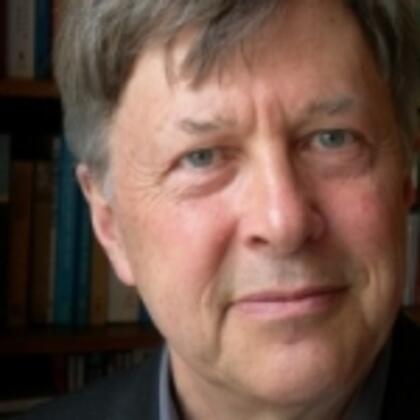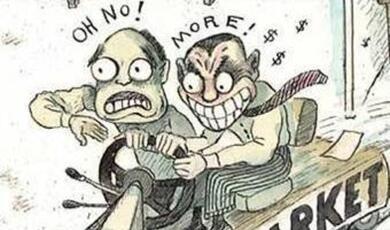Demonisation and witch hunts in religion and politics
Share
- Details
- Transcript
- Audio
- Downloads
- Extra Reading
The origins, character and life of political and religious witch hunts, and the relation between what people say, what they believe and what they do.
Download Transcript
DEMONISATION AND WITCH HUNTS IN
RELIGION AND POLITICS
1. Demonisation and destruction.
I've spoken so far this year of enmity in general terms, about the way the stories we tell about our enemies, real, supposed, imagined, or exaggerated, function to maintain social cohesion or support for government.
Those are the positive, or at least relatively harmless, function of the stories that are told about enemies
And rhetoric can be just that, rhetoric.
But descriptions of evil are always attached to real persons who can then be subjected to discrimination, imprisonment, harm, and death.
It's time to look at some particular events, and at the complex way in practice in which the frenzy of enmity can operate.
And because the relation between the stories told, the actions taken, and the character of the people of whom or against whom the stories are told is so flexible, and so much a matter of particular historical circumstance, there is no one pattern
Four different stories illustrate this
2. Four stories:
Story One: witches, in Scotland, England, and continental Europe from the fifteenth to the eighteenth centuries
Accusations of witchcraft witch hunts, witch trials, witch persecutions are most obviously at the extreme end of enmity: the accused are described as in alliance with an alien, indeed a supernaturally alien, being. Whilst other may be accused of allegiance to a foreign power, witches are accused of allegiance to an extra terrestrial one
*2 PICTURE
This supernatural allegiance was used to justify violence - torture to extract confessions, ritual killing to destroy not just the life of the evil doer, but the evil itself.
In such a world, denial is no more than an indication of guilt
*3 PICTURE
Allegations of pacts with the Devil and communing with demons, allegations were made usually, but not exclusively, within society, at a popular rather than an official level, and those so accused persecuted, tortured, and killed
They often arose from attempts to explain bad harvests and failed crops, or the sickness and death of people and livestock,
Stories about witches are embedded in the way people think about the world in general. They are plausible, not fantastic.
The way to understand what is going on is not to say 'how on earth can otherwise sensible or rational people believe something so fantastic?' but rather, 'what is it about the way such people think that makes their belief in witches and witchcraft reasonable and rational?'
If good and evil are real, and if there is not only a benign Deity, but a malign opponent, an evil counter-force, then siding with the Devil is plausible.
And if there is a reality beyond the merely superficial world of material appearances, magic can make sense too.
"There are more things in heaven and earth, Horatio,
Than are dreamt of in your philosophy"
But because an account of the world in which there is a place for witches and witchcraft can be, within its own terms, reasonable, it is also subject to reason. It is not a matter of simple irrational and unchangeable dogma or superstition, but is open to argument, reason, and choice.
Central European witchhunts from 1490, Malleus Maleficarum, but also refutation of it by Ulrich Molitor.
Both Protestantism and Catholic humanism provided a theological and rational argument against the existence of witches and witchcraft, and therefore against the torture and murder of the innocent, albeit deranged or deluded. The witch hunt attempted under the leadership of Heinrich Kramer in and around Innsbruck in 1485, was quashed by a joint response of the local religious and secular authorities, and those who had been condemned, were released. The Bishop of Brixen went so far as to set up an investigation of Kramer, despite the latter's papal authorisation.
The role of government in witch hunts
Government of all kinds will use, tolerate, or suppress witch-hunts according to their own needs, perceptions, and expectations.
Witchcraft accusations are tolerated or employed by rulers when they can be useful, as they were to Henry VIII who included witchcraft amongst the charges against his second wife, Anne Boleyn.
Puritans in Seventeenth Century England might bring charges of witchcraft in areas where they were on the ecclesiastical fringe; in areas where they were dominant or in control, they tended to resist such charges
So too in sixteenth century Scotland, the witch hunt was suppressed by the authorities when it became a threat to that very activity, governing, which, by pursuing those whom they considered witches, the witch hunters were in effect carrying out themselves
To admit to the presence of witches in areas which you governed was to suggest that your rule was incompetent. To make such suggestion in areas where others, of a different theological persuasion, were in power, was to criticise them, your opponents.
with the Civil War, royalist preachers began to invoke texts such as I Samuel 15:23 ['For Rebellion is as the Sin of Witchcraft...'] in order to stigmatize their opponents as agents of a diabolical pact against Church and State. Once again, the language of demonisation was infinitely flexible in its association with other aspects of politics, and provided a wide range of possibilities to those who employed it.
So on the one hand stories about enemies are not arbitrary.
But on the other they are not determined or inevitable.
To attempt to understand is to go beyond simple dismissal of a belief or story as absurd or superstitious nonsense, but it make a critical evaluation of that belief or story more feasible, not less, since the whole set of beliefs of which it is a part can be analysed and scrutinised
3. Story Two: Each story is different, and the respective roles of governments, political leaders, and more or less spontaneous social actions differs with the particular circumstances. So I'm going to leap forward a couple of hundred years, to the United States in the early 1950s, and a story about the slow assertion of government control over a different, but perhaps not so different, kind of witch hunt.
*4 PICTURE
February 1950, Wheeling, West Virginia, Senator Joseph McCarthy was addressing a local political meeting:
'while I cannot take time to name all the men in the State Department who have been named as active members of the Communist Party and members of a spy ring, I have here in my hand a list of 205 - a list of names that were made known to the Secretary of State as being members of the Communist Party and who nevertheless are still working and shaping policy in the State Department.'
It's notable that McCarthy is doing here exactly what puritans in seventeenth century England were doing in areas where they were not in control. Just as the existence of witches could be used as evidence of the incompetence or worse of government, so could the existence of alleged communist spies in the State Department under a Democrat President, Harry S Truman, be used by a Republican politician.
Campaign both public - spreading the allegations - and congressional, in Committee on Government Operations' Permanent Subcommittee on Investigations
The populist tone from the beginning: there were traitors, and government was lax or worse, and those who were not traitors were dupes
During 1952 presidential campaign, McCarthy attacked the Democrat presidential candidate Adlai Stevenson, 'who endorses and would continue the suicidal Kremlin-shaped policies of this nation'
Demonisation justifies extreme measures, and sets up barriers to criticism, so that opposition or questioning is itself a mark of guilt:
When in March 1954 the Senate set limits on McCarthy's activities, he declared it was a victory for those 'who fear exposure of Communists'
In April 1954 McCarthy described, on television, Edward R Murrow, who had presented a critical TV report on the senator and his activities, as 'the leader and the cleverest of the jackal pack which is always found at the throat of anyone who dares to expose Communists and traitors'.
But whilst McCarthy, whilst not a political leader, was nonetheless a politician, his narrative drew on beliefs and understandings which were to be found in all kinds of reaches of 'ordinary' American life
Exaggerating the vernacular
The rhetoric draws on religious, or supernatural, or non-human images:
former Communist and subsequent McCarthy committee informant, Louis Budenz, declared that books which were sympathetic to communism could 'poison the wells of public opinion' and could be a 'method of breeding communism throughout the world'. Plague!
The life cycle of the campaign is similar to that of witch hunts
Such a narrative immediately challenges government, which must either condone and appear to lead, or suppress the witch hunt
And government is in a dilemma, because the charges do not come from nowhere:
House Un-American Activities Committee from 1938 had moved from Ku Klux Klan and Nazism, to Communism.
The federal government began by attempting to upstage McCarthy, and the Attorney General, Herbert Brownwell, told US News and World Report in August 1953 that members of the Communist Party were 'a greater menace now than at any time' and praised congressional committees for their work on the matter. Shortly afterwards he announced that the administration had dismissed 2,200 'security risks' without specifying what the risks were.
But by the end of 1954, with the Army McCarthy hearings 'Then what's all the fuss about?' (Joseph Welch) , and a Senate condemnation, the White House could distance itself and remove McCarthy from its guest list
Just as with the witch hunts of the sixteenth and seventeenth centuries, the story told by the communist traitor hunters made sense in terms of their wider view of the world. But it also made sense for government, eventually, to suppress the hunt and the hunter.
4. Story Three: China, The Cultural Revolution, 1966-76,
*5 PICTURE
How different from either the metaphysical world of sixteenth and seventeenth century Christian Europe, or the ideologically melodramatic world of 1950s USA, was the secular, materialist world of China after the Communist take over?
The origins are the opposite of those in the previous two cases.
Begun by Mao who considered himself to be losing control of the direction of politics
The rhetoric identified an enemy which stood both for the ways things had been before the revolution, and for an attack on the revolution.
The charges were counter-revolution, bourgeois thinking and conduct, anti-Mao, and aiding enemies abroad.
A melange of charges
But there was also supernatural or religious rhetoric: The bureaucratic class were becoming a bourgeoisie, and were 'sucking the blood of the workers'
'sweep away all of the Monsters and Ghosts'
Treason is a charge of infinite application, and almost anything can be taken as a sign of alliance with some evil conspiracy or other
*6 PICTURE
Red Guards became a force for unpredictable orthodoxy and conservatism - pro western signs were looked for not just in policies and actions, but in alleged ideas or even ways of dress
Those identified as counter revolutionaries or bourgeoisie or traitors were publicly humiliated, tortured, and driven by a mixture of these devices to 'confess'
The erratic course of these events was not a matter of accusations leading to persecution, or of persecution seeking justification in accusations, but of a parallel or interlinked development of the two
Mao gave his support to all of this, without being able to control it.
The Cultural Revolution became vernacular and within a year he turned to the army to restore a more traditional form of order, and in 1968 the Red Guards were diverted to the countryside for re-education.
The turmoil which ensued was not finally brought to an end until the death of Mao in 1976 when the cultural revolution was finally suppressed
So the Cultural Revolution of 1966 to 1976 had both similarities and dissimilarities with the European witchhunts and the McCarthy anti-communist campaign. It was finished, like them, from the top, but it also, unlike them, began there. It's extreme language went beyond a story of human opponents and, like their language, drew on metaphysical ideas of non human good and evil.
5. Story Four: Australia and the 'Greek Conspiracy'
This is not a story of demonisation, but is a story of the telling of a story which identified, and to that extent created, a group which was then attacked
In Sydney Australia in 1978, a belief in, or allegation of, a criminal conspiracy against the state and its social services led to a series of raids against Greek citizens with 180 arrests, and the following and accompanying court proceedings and press coverage, constituted a racist portrayal of a Greek character and community which was different from and inferior to that of 'ordinary' Australians, and in dealing with whom therefore, methods which would not be used against 'normal' citizens and which might infringe the law, were justified.
Greek mutual help and use of doctors, lawyers, the prominent educated, as intermediaries, was taken as evidence of a criminal organisation, for whom the authorities employed the term 'kolpo'; no such organisation existed. The press spoke of a 'Greek conspiracy', of the 'Greek community'.
But in the end, and after eight years, the entire proceeding against a criminal conspiracy collapsed.
6. What each of these stories has in common with the others:
a) The life cycle of demonisation and the crucial role of government. Demonisation may arise 'spontaneously', but it will either overthrow government or be overthrown by it. In the long run they cannot co-exist.
Enmity can unite a society, but for the expression of that enmity to create order, it seems as if some form of government or control is necessary. Vigilante enmity is disruptive and unpredictable, the very opposite of order:
A government in whose territory 'vigilante' persecution occurs is either complicit or out of control.
So despite the attractions of demonisation for a government which wishes to stigmatise an opponent, tighten control, or strengthen loyalty, there is the danger of creating the impression that one is NOT in control, or why would the traitors, the demons, the witches, be there.
Alternatively, you may be committing yourself to permanent, or at least extended, revolution.
b) The accusations do not come out of the air - they are not implausible, but are a development of ideas which are already current. Demonisers, in other words, are not madmen, and we misunderstand and underestimate them if we treat them as simply pathological.
Their stories make sense, which is why they can be so dangerous
So demonisation takes place within a whole ideology or world view. Witches, communist subversives, and bourgeois saboteurs were not bizarre conceptions added on to an otherwise 'normal' view of the world. They were a part of a whole view of things, to which they contributed, and by which they were sustained.
c) However rational or common sense the narrative, it will frequently have a super-natural or metaphysical dimension. It is not that religion gives special sanction, but rather that for the justification of the most extreme forms of harm, extreme and or absolute meanings are used.
Some people spoke of the Twentieth Century as the secular century. But the metaphysical dimension, in one form or another, never went away.
d) Demonised are described as deviant or alien, but the demoniser is correspondingly defined as super ordinary
e) The complex relation between telling the story and persecuting those whom the story describes, and the elaboration of the story to justify and explain the persecution
Narrative and persecution go hand in hand
The relation between narrative and persecution is a symbiotic one, not a one way causal one.
Action as meaningful and justified behaviour, so chicken AND egg
Do people demonise those they wish to persecute, or wish to persecute those whom they demonise. Neither. At each stage there are choices, at each choice there are consequences for the setting within the next choice is taken
Actions and accusations are not separate things, but different aspects of the same thing, whilst at the same time action is a matter of making choices, which change the context in which the next action is taken
Choices can be made and are made. ('Men make their own history')
This suggests that those who argue that persecution can be avoided if there is an end to discriminatory or inflammatory language have oversimplified the case, but nor can their objection be dismissed. You can only persecute a group if you have first, or at the same time, told a story which creates or identifies that group, the 'Greek community' for instance
Sincerity and deception in the depiction of enemies.
So to ask whether demonizers are sincere or charlatans doesn't take us very far. They are using rhetoric as part justification, part explanation, of their actions. And what matters, after all, is the public impact of what they do, not its private motive
What is important is to recognise that, in the contexts in which they are operating, their narratives and accusations make sense. But that is not the same as saying that they are the only available or possible narratives.
Witchcraft narratives were refuted by critics like Molitor, McCarthyism by journalist like Murrow, the 'Greek conspiracy' by a collection of lawyers, journalists, and political activists.
Demonisation is neither inevitable nor pathological, so those who wish to oppose it have at one and the same time to recognise its roots in existing beliefs and practices, and understand that those beliefs and practices are themselves neither absolute nor given, but the result of choices.
And choices are what politics is all about.
©Professor Rodney Barker, Gresham College, 7 January 2008
This event was on Mon, 07 Jan 2008
Support Gresham
Gresham College has offered an outstanding education to the public free of charge for over 400 years. Today, Gresham plays an important role in fostering a love of learning and a greater understanding of ourselves and the world around us. Your donation will help to widen our reach and to broaden our audience, allowing more people to benefit from a high-quality education from some of the brightest minds.


 Login
Login







